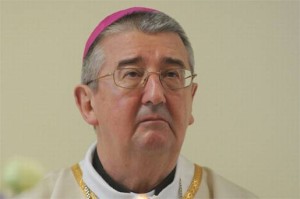
By Sarah Mac Donald - 05 March, 2015
 In a major address on the Synod on the Family, Archbishop Diarmuid Martin of Dublin said Christian married couples have a mission within the Church which must be fostered and never supplanted.
In a major address on the Synod on the Family, Archbishop Diarmuid Martin of Dublin said Christian married couples have a mission within the Church which must be fostered and never supplanted.
Speaking in All Hallows College in Dublin on Wednesday evening, the Archbishop, who represented the Irish Church at last October’s Extraordinary Synod in Rome and will attend this October’s follow-on meeting, described Christian marriage and family life as ecclesial realities.
In his talk, ‘The Synod on the Family: What can we expect?’ the Archbishop of Dublin said the Synod’s own analysis was very realistic and recognised that the perfect family rarely exists.
But he added, “The perfect family rarely exists, but in the midst of great challenges great families exist and struggle and they must be supported.”
“All over the world families struggle. Families struggle due to poverty, unemployment and marginalisation. Families find it difficult to transmit faith to their children.”
He said that in many parts of the world, families are struck by wide-scale emigration and the separation that this entails.
“In my discussion group there was a married couple from Iraq who spoke movingly of the struggle that families in that region face, being driven from their homes if they do not renounce their Christian identity.”
With over 190 Synodal Fathers from so many countries it was inevitable that the concerns and challenges would be different in different parts of the world he explained.
Bishops from Africa spoke about polygamy; bishops from Asian countries where Christians were in a minority spoke about marriage between people of different faiths. There were discussions about processes of annulments, Dr Martin related.
He highlighted that a bishop from Greece had mentioned to him that he had many Irish weddings taking place on his Islands, arranged by marriage planners as a sort of business within which the faith dimension was reduced to a colourful ceremony.
The Synod, the Primate of Ireland explained, stressed that marriage preparation and the accompaniment of marriage is a life-long task and one which belongs within the work of parishes and the day to day life work of evangelisation and cannot be outsourced.
“Our cultures have allowed Church weddings to become too expensive for many. Permanence in human relations is difficult today. Marriages fail.”
“The strong message of the Synod was a call for a radical renewal of the Church’s pastoral support for marriage and the family. In the pluralism which exists today in every part of the world we need a radical catechesis on marriage and the family.”
“Marriage preparation is not just preparation for a Church wedding, much less a matter for filling-out canonical forms. Marriage must be understood as part of a life-long catechesis or itinerary of faith about the Sacrament of Marriage,” he said.
He said it was inevitable that in reporting a major Church event like the Synod certain issues would be given particular attention and become ‘celebrity issues’.
In the case of last year’s Synod, the celebrity issues were the possible admission of divorced and civilly remarried Catholics to Holy Communion and the pastoral response to people of homosexual orientation.
The biggest challenge, he suggested, was how in today’s complex cultural situation can the Church open a dialogue with men and women and young people where they are and lead them to a deeper idea of the Christian understanding of marriage.
“This will surely involve a radical rethinking of the Church’s pastoral care for marriage and catechesis among young people in the future.”
The bishops in Rome had stressed that their concern about couples who were divorced and remarried did not undermine their absolute commitment to the Church’s teaching on the indissolubility of marriage.
“There was never any idea that the Church would simply say to all and sundry that since their marriage had broken down and that they had entered into another union that they automatically could receive the Eucharist,” according to Archbishop Martin.
There was a recognition that people will not come to understand the Church’s teaching simply by decree or dictate. The real problem is that the Church has been negligent in presenting its own teaching more effectively.
Does that mean that the Church should simply recognise social change and either change its teaching or shut up? he queried.
“What the Church in Ireland has been weak on is that of presenting in a convincing way to our younger generations the values which underlie our teaching on marriage and the family,” he suggested.
The sacrament of marriage is a sacrament given for the building up of the Church. Christian married couples have a calling and a special charism within the Church which should make them active protagonists in fostering the values of love and life, of permanence and fruitfulness, which are the essential of marriage life.
The Church must also listen to married couples. The Church must listen also to where God is speaking through the witness of those Christian married couples who struggle and fail and begin again and fail again.
The experience of failure and struggle cannot surely be irrelevant in arriving at the way we proclaim the Church’s teaching on marriage and the family.
The Church must reach out to encounter families where they are, but that does not mean that you simply leave people where they are.
The Church speaks of a law of gradualness, not in the sense that “anything goes”, but that we can be led, by the help of grace, to move step-by step towards living our Christian vocation more fully, Archbishop Martin said.